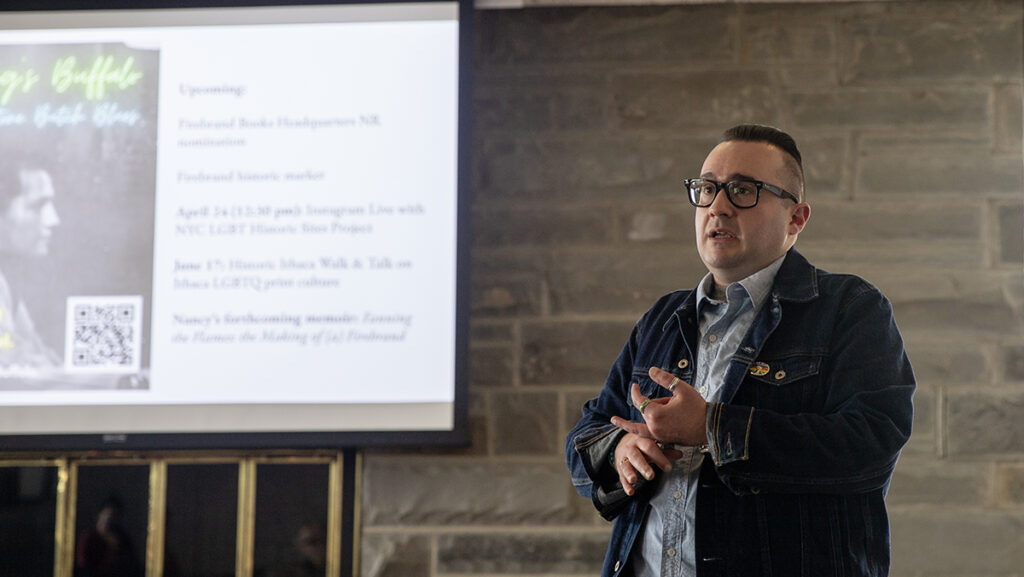Jeff Iovannone, a public historian specializing in LGBTQ+ heritage conservation in Buffalo, New York, visited Ithaca College April 4 to discuss his digital exhibit of historical LGBTQ+ sites that appear in Leslie Feinberg’s novel, “Stone Butch Blues.”
About 10 members of the campus community joined Iovannone in Clarke Lounge to hear him speak about his work and the work of Feinberg. Feinberg was a secular Jewish, transgender, lesbian woman as well as an activist and author. Zie authored several books, including “Stone Butch Blues,” which is a fictional story about a butch lesbian living in America in the 1970s. The novel was published at Firebrand Books in Ithaca in 1993 and Iovannone not only included the Firebrand Books building — which now houses the Yellow Deli — in his exhibit but also worked to have the building historically preserved.
Iovannone said he wanted to share the digital mapping of “Stone Butch Blues” with the college community because the Ithaca LGBTQ History Walking Tour inspired some of his work. The walking tour was created during the 2018–19 academic year by students and Luca Maurer, executive director for Student Equity, Inclusion, and Belonging and the outgoing director of LGBTQ Education, Outreach and Services.
“We have all of these sites in Ithaca, which is a relatively small city, but I noticed that none of the sites that were on the walking tour had been officially designated,” Iovannone said. “Now the building can’t be demolished. It exists so that we can continue to tell the story. And I thought Firebrand — with everything that Luca and the IC students had documented — was the best candidate for a local landmark nomination.”
Iovannone said he originally sought to find if Feinberg’s novel could be used to identify and document sites in Upstate New York that are associated with LGBTQ+ heritage. He eventually found 41 sites in Buffalo and one in Ithaca.
“I developed the argument that ‘Stone Butch Blues’ is actually a very spatial novel,” Iovannone said. “We can actually read it as a map of queer Buffalo during the 1960s and 1970s. And not only can we do that, but this map can then further be used as the basis for future LGBTQ heritage conservation projects in Buffalo and also upstate New York.”
Iovannone used a geographic information computer system that analyzes and displays geographically referenced information to show the locations referenced in “Stone Butch Blues.”
“Have you done a project like this, this sort of GIS mapping thing, or just how did you get into that particular aspect?” Chip Gagnon, professor and chair in the Department of Politics, said.
Iovannone said he began researching the geography of “Stone Butch Blues” in 2019 when he was in the historic preservation master’s program at Cornell University. His professor for a class called Making Public Queer History suggested turning his research into a digital exhibit using GIS mapping.
“At that time, I just had a spreadsheet where I was keeping track of, ‘Here’s the place in the book. This is what I think it is,’” Iovannone said. “I did a very small version of it for my project for the class, which I think focuses on eight sites or so, and then I was able to get a grant from Cornell to finish.”
Iovannone said travel guides and maps have long-standing significance within LGBTQ+ history because they provided information about safe, inclusive spaces. Bob Damron’s Address Books documented queer spaces across America from 1965 to 1985 and are now digitally documented on Mapping the Gay Guides.
“I did use some of the Damron’s address books to help locate some of the places in Buffalo that are in the [Feinberg] book,” Iovannone said. “It’s not until the 1990s that we started to see LGBTQ mapping projects intersecting with historic preservation and actually documenting places of historical significance to the community.”
Columbia FunMaps and the NYC LGBT Historic Sites Project are examples of these preservation mapping projects in New York City, as well as Iovannone’s own project focusing on Buffalo. He said his long-term goal is to have a project like the NYC LGBT Historic Sites project for all of Upstate New York.
Of the historical LGBTQ+ sites Iovannone found through “Stone Butch Blues,” he said the ones that were demolished were more strongly associated with LGBTQ+ people, working-class people or both groups.
“This is kind of something to think about in terms of future preservation efforts in Buffalo,” Iovannone said. “Can we be more proactive about preserving these types of spaces? Because we know if we look at the history that they have tended to be undervalued and therefore demolished.”
Some historic sites represent oppression of LGBTQ+ people, like the building that was formerly the “Buffalo State Asylum for the Insane” — a facility that institutionalized LGBTQ+ people. Now, the building is a hotel and hosts conferences and events after having passed through several phases of ownership.
“What is the general stance on keeping those buildings preserved?” LGBTQ Pride Fellow Grace Dosdall said. “Is the stance that they should be preserved or that we should be demolishing them?”
“My perspective is, we have to find a balance between … reusing the building and not having that negative environmental impact while also being very honest about what took place there,” Iovannone said. “And maybe that adaptive reuse of the building can give back to the communities that are implicated in that history.”
Iovannone will be hosting two additional events related to sites in Ithaca and Buffalo connected to Feinberg. The next event is an Instagram live conversation April 24 with the NYC LGBT Historic Sites Project and the second event is a short walking tour July 17 in Ithaca that specifically focuses on LGBTQ+ print culture.









